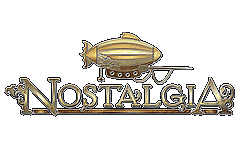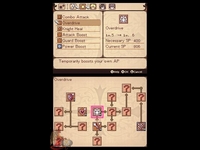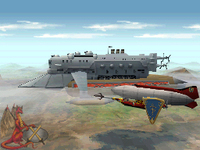|
|

|
PLATFORM
|
DS
|
BATTLE SYSTEM
|

|
INTERACTION
|

|
ORIGINALITY
|

|
STORY
|

|
MUSIC & SOUND
|

|
VISUALS
|

|
CHALLENGE
|
Unbalanced
|
COMPLETION TIME
|
20-40 Hours
|
|
OVERALL

|
+ Gameplay has no glaring, notable faults
- Story is terrible
- Some balance issues pull down the experience
- Lacks charm, soul, personality, and fun
|
Click here for scoring definitions
|
|
|
Naming an RPG Nostalgia is on the pretentious side, but it makes a clear promise to the wandering impulse-buyer. It sets expectations at "average," assuring the would-be purchaser that this traditional JRPG will pack few surprises, and a genre that has not changed much over the last couple of decades will flaunt its lack of change here. The hope is that a charming copy-and-paste job will flood the player with warm feelings of the good old days. Memories of a carefree childhood will comfort and soothe the soul in a way that no other traditional JRPG can provide. It makes for good advertising, but the final product in this case is bland in every way. If Nostalgia is comfort food, it is toast without jam, grits without butter, biscuits without gravy, and the couple new ideas it tosses into the mix are poorly executed with an overall lack of gameplay polish and balance.
The less said about Nostalgia's plot, the better. The simple story revolves around getting a mysterious girl, who has amnesia and a knack for being kidnapped, to collect tablet pieces hidden around the world. There are capable adults ordering children to fight for them, the intentional collection of objects that will destroy the Earth when gathered, teleporting villains who pop up at the end of every single dungeon to say "Buahahahaha, now I will take the tablet piece," a metal pendant that gets dropped often throughout the game at the most convenient of times, and characters who fall from airships and towers but somehow survive. The issue is not just that the plot is a sequence of clichés, but that the same clichés are used multiple times, often in sequential story segments. Even the game's few potentially touching moments are butchered, as one second a beloved relative dies, and then the very next sentence is "Well, let's get back to the airship." Toss in party members with no personality and a dry script, and dialogue bubbles soon become an exercise in how quickly the A button can be pressed.
The story and script are the only aspects of Nostalgia that really stand out as being awful, though; the rest of the game is dull and generic, but not necessarily bad. Combat is a typical turn-based setup with the player controlling four party members against whatever monsters are randomly encountered in dungeons. The four party members have recognizable, unalterable classes — a knight, thief, black mage, and white mage — and their abilities are the same as could be expected from any Final Fantasy game with those jobs. As battles are won, skill points are earned. They are shared across everyone in the party and used to level up abilities. Some new skills are gained merely by leveling up, but many are unlocked by using SP to advance base abilities. The skill tree clearly shows dependencies. This is the only customizable aspect of the game, and it can be fun deciding on whom and on which skills to use SP when healing spells, attack abilities, and airship skills are all powered up by spending from the same SP pool.
 Deciding which skills to advance is the most interesting, and only, form of strategy in the game.
Deciding which skills to advance is the most interesting, and only, form of strategy in the game.
|
|
Airship combat is the one new thing Nostalgia brings to the table. The game's setting is an alternate version of the Earth in the 19th century where the world is traversed via airship. Rather than waiting until the end of the game to provide the player with a means of fast travel, an airship is given to the party right at the start. Naturally, this being an RPG, the sky is filled with random encounters just like any dungeon. During airship battles, each party member controls a unique weapon and attacks in a turn-based manner; the key difference between sky combat and ground combat is that although characters take separate turns, they all share the ship's HP. If the ship's life total hits zero, the game is over.
Aside from a general blandness in the gameplay mechanics, the game suffers from many odd balance issues that come across as unintentional. At the start, skills are expensive to use and characters have low MP totals. In an early dungeon, a party member might have 30 MP, the cheapest skill costs 8 MP to use, and twenty encounters might occur between the entrance and the first save point, so several dozen foes must be slain while a powerful attack ability has only three uses. Expect to select "attack" from the menu many, many times. Later in the game, the opposite is true. Maximum MP values are through the roof, but skill costs are about the same as they are at the start, so combat consists of spamming nothing but each character's best skill. This alone makes the difficulty in dungeons go from mindlessly tough to mindlessly easy. Also, until the white mage joins the party and gains the ability to resurrect allies, there is no way to bring dead characters back to life in a dungeon aside from an incredibly expensive item that is unaffordable at the start of the game.
Airship battles have their issues too. There are times where sky encounters abruptly become more difficult, seemingly balanced on the assumption that the player has the best airship equipment available. The problem is that you have to fly to the next city to purchase said equipment, so it cannot possibly be equipped yet when the encounters become tougher. Because the success rate of fleeing is next to zero if the game deems the fight hard enough, the best strategy is to save often while soaring across dangerous skies. Of course, it takes a surprise game over to realize that air enemies can now down the ship in two turns. Even with the best airship equipment, flying foes toward the end of the game have so much HP that a single battle takes over a minute to win. That is a lot of time to spend selecting the same skills over and over while in no danger, and although it might feel epic to some, watching it play out is rather boring.
 Hope you think this screen is pretty, because this inescapable encounter takes a while to finish every time.
Hope you think this screen is pretty, because this inescapable encounter takes a while to finish every time.
|
|
Nostalgia suffers from an overall lack of creative thinking. Aside from the aforementioned story woes, the main quest itself is repetitive. The fifth time the player is sent out to a dungeon, he is sent back to the third dungeon in the game. The seventh trip out sends the player back to the game's opening sewer dungeon to refight level one rats. As progress is made, optional side quests open up that send the party right back to the previous dungeon for a fetch quest with a pitiful monetary reward. Unless you like the idea of running through a dungeon twice in a row, beating up the same small variety of enemies a second time to pick up a trinket for an old man at a bar, the side quests are not worth pursuing.
The presentation is equally uncreative. The score tries too hard to be bombastic and epic, instead coming across as a mediocre fanfare that never ends, stomping over any attempt to create an atmosphere that pulls the player into the game. Visually, the 3D graphics are impressive — Matrix keeps getting better and better at DS 3D — but the art direction is horrendous. The textures are all shades of gray, brown, and green, and it paints a dreary portrait that wears on the eyes early and never gets colorful or interesting. For a setting based on Earth, it could have been beautiful and warm, but instead the player is sent to jungles, pyramids, and caves where everything is monochrome. Monster and character designs are also uninspired. One big positive for the visuals comes while flying around the world. The game looks fantastic both in airship battles and while navigating around, and really shows off what Matrix can do.
There is nothing wrong with a generic JRPG, but Nostalgia lacks many pieces of a good game. It has no charm to it, no soul, and is bland, boring, dull, sad, and droopy. It avoids everything Brave Story: New Traveler did well, and while Crimson Gem Saga benefited from an awesome Atlus USA localization, Ignition was not able to save the experience here. Many minor oddities persist throughout the game, and it feels like Nostalgia needed more playtesting. The ability to steal is available from the start, but enemies rarely carry items. Elemental weaknesses are illogical and there is no way to scan foes to learn them. In one dungeon, an alligator is weak to ground magic and a snake is weak to air magic. The main character's strongest skill for the entire game is the first one he learns. The black mage usually does as much damage with her basic attack as she does with her spells.
I did feel nostalgia while playing this. It genuinely brought back memories of playing Game Boy games in the mid-90s during long car trips as a kid. Alleyway and Battleship. Super Mario Land and Castlevania: The Adventure. Games that were not bad, but as soon as the trip was over I happily left the Game Boy in the travelling case and went back to real games on the SNES. Nostalgia is not a bad game, but it is not very fun, and it will not bring back positive memories of childhood gaming. For some it may be worth trying out, but there are many JRPGs on the DS right now that are more fun, more charming, more worth your time, and more likely to remind you of the good old days of being a young RPGamer.
Review Archives
|









